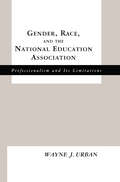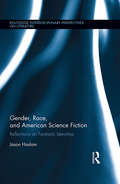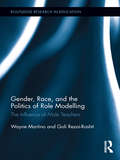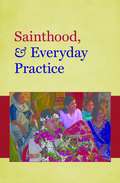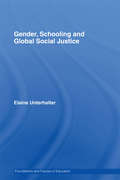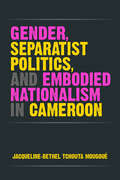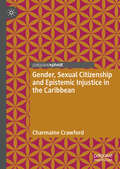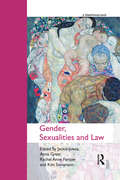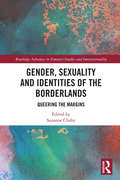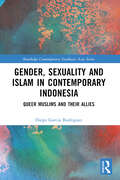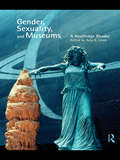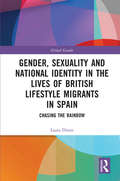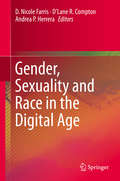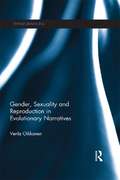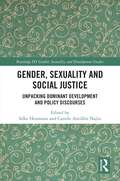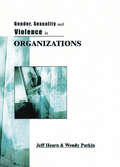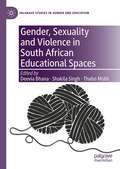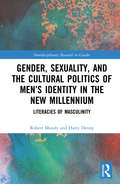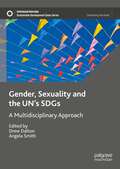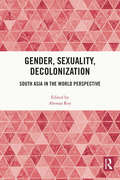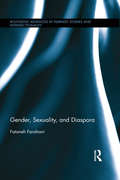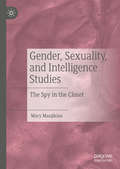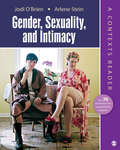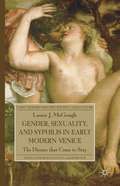- Table View
- List View
Gender, Race and the National Education Association: Professionalism and its Limitations (Studies in the History of Education)
by Wayne J. UrbanUrban presents the NEA in its historical context, turning a fair and clear eye on this powerful and controversial organization, and using this context to both criticize and commend. The culmination of a three decade long study, this unique volume presents an unusually thorough and much needed holistic view of the NEA.
Gender, Race, and American Science Fiction: Reflections on Fantastic Identities (Routledge Interdisciplinary Perspectives on Literature)
by Jason HaslamThis book focuses on the interplay of gender, race, and their representation in American science fiction, from the nineteenth-century through to the twenty-first, and across a number of forms including literature and film. Haslam explores the reasons why SF provides such a rich medium for both the preservation of and challenges to dominant mythologies of gender and race. Defining SF linguistically and culturally, the study argues that this mode is not only able to illuminate the cultural and social histories of gender and race, but so too can it intervene in those histories, and highlight the ruptures present within them. The volume moves between material history and the linguistic nature of SF fantasies, from the specifics of race and gender at different points in American history to larger analyses of the socio-cultural functions of such identity categories. SF has already become central to discussions of humanity in the global capitalist age, and is increasingly the focus of feminist and critical race studies; in combining these earlier approaches, this book goes further, to demonstrate why SF must become central to our discussions of identity writ large, of the possibilities and failings of the human —past, present, and future. Focusing on the interplay of whiteness and its various 'others' in relation to competing gender constructs, chapters analyze works by Nathaniel Hawthorne, Mary E. Bradley Lane, Edgar Rice Burroughs, Philip Francis Nowlan, George S. Schuyler and the Wachowskis, Frank Herbert, William Gibson, and Octavia Butler. Academics and students interested in the study of Science Fiction, American literature and culture, and Whiteness Studies, as well as those engaged in critical gender and race studies, will find this volume invaluable.
Gender, Race, and the Politics of Role Modelling: The Influence of Male Teachers (Routledge Research in Education)
by Wayne Martino Goli Rezai-RashtiThis book provides an illuminating account of teachers’ own reflections on their experiences of teaching in urban schools. It was conceived as a direct response to policy-related and media-generated concerns about male teacher shortage and offers a critique of the call for more male role models in elementary schools to address important issues regarding gender, race and the politics of representation. By including the perspectives of minority teachers and students, and by drawing on feminist, queer and anti-racist frameworks, this book rejects the familiar tendency to resort to role modelling as a basis for explaining or addressing boys’ disaffection with schooling. Indeed, the authors argue, on the basis of their research in urban schools in Canada and Australia, that educational policy concerned with male teacher shortage and the plight of disadvantaged minority boys would benefit from engaging with analytic perspectives and empirical literature that takes readers beyond hegemonic discourses of role modelling. A compelling case is presented for the need to disarticulate discourses about role modelling from a politics of representation that is committed to addressing the reality of the impact of racial and structural inequalities on both minority teachers and students’ participation in the education system. The book also provides insight into the persistence of gender inequality as it relates to the status of elementary school teaching as women’s work.
Gender, Sainthood, and Everyday Practice in South Asian Shi’ism
by Karen G. RuffleIn this study of devotional hagiographical texts and contemporary ritual performances of the Shi'a of Hyderabad, India, Karen Ruffle demonstrates how traditions of sainthood and localized cultural values shape gender roles. Ruffle focuses on the annual mourning assemblies held on 7 Muharram to commemorate the battlefield wedding of Fatimah Kubra and her warrior-bridegroom Qasem, who was martyred in 680 C.E. at the battle of Karbala, Iraq, before their marriage was consummated.Ruffle argues that hagiography, an important textual tradition in Islam, plays a dynamic role in constructing the memory, piety, and social sensibilities of a Shi'i community. Through the Hyderabadi rituals that idealize and venerate Qasem, Fatimah Kubra, and the other heroes of Karbala, a distinct form of sainthood is produced. These saints, Ruffle explains, serve as socioethical role models and religious paragons whom Shi'i Muslims aim to imitate in their everyday lives, improving their personal religious practice and social selves. On a broader community level, Ruffle observes, such practices help generate and reinforce group identity, shared ethics, and gendered sensibilities. By putting gender and everyday practice at the center of her study, Ruffle challenges Shi'i patriarchal narratives that present only men as saints and brings to light typically overlooked women's religious practices.
Gender, Schooling and Global Social Justice (Foundations and Futures of Education)
by Elaine UnterhalterTimely and original, this book examines gender equality in schooling as an aspiration of global social justice. With nearly one billion people having little or no schooling and women and girls comprising nearly two-thirds of this total, this book analyses the historical, sociological, political and philosophical issues involved as well as exploring actions taken by governments, Inter-Government Organisations, NGOs and women’s groups since 1990 to combat this injustice. Written by a recognised expert in this field, the book is organised clearly into three parts: the first provides a background to the history of the provision of schooling for girls worldwide since 1945 and locates the challenges of gender inequality in education the second examines different views as to why questions of gender and schooling should be addressed globally, contrasting arguments based on human capital theory, rights and capabilities the third analyses how governments, Inter-Government Organisations and NGOs have put policy into practice. Addressing the urgent global challenges in gender and schooling, this book calls for a new connected approach in policy and practice. It is essential reading for all those interested in education, along with developmental studies, sociology, politics and women’s studies.
Gender, Separatist Politics, and Embodied Nationalism in Cameroon (African Perspectives)
by Jacqueline-Bethel Tchouta MougouéGender, Separatist Politics, and Embodied Nationalism in Cameroon illuminates how issues of ideal womanhood shaped the Anglophone Cameroonian nationalist movement in the first decade of independence in Cameroon, a west-central African country. Drawing upon history, political science, gender studies, and feminist epistemologies, the book examines how formally educated women sought to protect the cultural values and the self-determination of the Anglophone Cameroonian state as Francophone Cameroon prepared to dismantle the federal republic. The book defines and uses the concept of embodied nationalism to illustrate the political importance of women’s everyday behavior—the clothes they wore, the foods they cooked, whether they gossiped, and their deference to their husbands. The result, in this fascinating approach, reveals that West Cameroon, which included English-speaking areas, was a progressive and autonomous nation. The author’s sources include oral interviews and archival records such as women’s newspaper advice columns, Cameroon’s first cooking book, and the first novel published by an Anglophone Cameroonian woman.
Gender, Sexual Citizenship and Epistemic Injustice in the Caribbean
by Charmaine CrawfordThis book interrogates the relationship between gender, sexual citizenship and epistemic injustice as it relates to the experiences of LGBTQ persons in the Commonwealth Caribbean. Whether it is the recognition of gender/sexual identities, sexual freedom, bodily autonomy, marriage or creating a family, sexual citizenship encompasses different aspects of our intimate lives that have erotic, social, and economic value that are organised and legitimised through the family, religion, law, state, family, and civil society. Employing decolonial feminist queer perspectives, this book considers how race, gender, and sexuality intersect through matrices of power in shaping intimate life in giving more rights and freedoms to some over others. While Caribbean sexualities are rich and diverse, there still exists dominant colonial and post-colonial heteropatriarchal ideologies and practices that infringe on the sexual rights of Caribbean LGBTQ persons normalising discriminatory treatment (homophobia, lesbophobia and transphobia) against them. Despite efforts to silence Caribbean LGBTQ persons, they have politicised their cause by engaging in epistemic resistance. Caribbean LGBTQ activism encompasses a myriad of social justice efforts, incorporating intersectional politics with feminists and other groups, which validate queer identities, knowledges and lives in the region and diaspora. This book showcases how Caribbean LGBTQ activists are using strategic litigation anchored in social justice hermeneutics to upend vagrancy and anti-buggery laws, which has led to successful decriminalisation cases in the region. This book will interest researchers and students in women’s, gender, and sexuality studies and Caribbean studies.
Gender, Sexualities and Law
by Kim Stevenson Jackie Jones Anna Grear Rachel Anne FentonBringing together an international range of academics, Gender, Sexualities and Law provides a comprehensive interrogation of the range of contemporary issues – both topical and controversial – raised by the gendered character of law, legal discourse and institutions. The gendering of law, persons and the legal profession, along with the gender bias of legal outcomes, has been a fractious, but fertile, focus of reflection. It has, moreover, been an important site of political struggle. This collection of essays offers an unrivalled examination of its various contemporary dimensions, focusing on: issues of theory and representation; violence, both national and international; reproduction and parenting; and partnership, sexuality, marriage and the family. Gender, Sexualities and Law will be invaluable for all those engaged in research and study of the law (and related fields) as a form of gendered power.
Gender, Sexuality and Identities of the Borderlands: Queering the Margins (Routledge Advances in Feminist Studies and Intersectionality)
by Suzanne ClisbyDrawing on border thinking, postcolonial and transnational feminisms, and queer theory, Gender, Sexuality and Identities of the Borderlands brings an intersectional feminist and queer lens to understandings of borderlands, liminality, and lives lived at the margins of socio-cultural and sexual normativities. Bringing together new and contemporary interdisciplinary research from across diverse global contexts, this collection explores the lived experiences of what Gloria Anzaldúa might have called ‘threshold people’, people who live among and in-between different worlds. While it is often challenging, difficult, and even dangerous, inhabiting marginal spaces, living at the borders of socio-cultural, religious, sexual, ethnic, or gendered norms can create possibilities for developing unique ways of seeing and understanding the worlds within which we live. This collection casts a spotlight on the margins, those ‘queer spaces’ in literary, cinematic, and cultural borderlands; postcolonial and transnational feminist perspectives on movement and migration; and critical analyses of liminal lives within and between socio-cultural borders. Each chapter within this unique book brings a critical insight into diverse global human experiences in the 21st Century.
Gender, Sexuality and Islam in Contemporary Indonesia: Queer Muslims and their Allies (Routledge Contemporary Southeast Asia Series)
by Diego Garcia RodriguezGender, Sexuality and Islam in Contemporary Indonesia explores gender, sexuality and religion in contemporary Indonesia. It is the first book-length analysis of the experiences of queer Muslims in Indonesia, the largest Muslim country and the world’s fourth most populous nation, as well as the first monograph exploring the voices of their allies vis-à-vis the role of Indonesian progressive Islam and Islam Nusantara. An ethnographic study based on semi-structured in-depth interviews, participant observation and media analysis, the book analyses how queer Indonesian Muslims come to, and navigate, their gender, sexual and religious subjectivities and subject positions, beliefs and practices. This is done by paying attention to their interactions with family, education, media, and peers. It also investigates the emergence of queer religious geographies through the case of an annual camp leading to alternative discussions on gender, sexuality, and religion impacting processes of subjectivity formation among participants. The author draws on recent scholarship that attends to ‘agency’ not merely as a synonym for resistance but also as a modality of action to examine the rise of queer religious agentic systems through the everyday practices of queer Muslims. Finally, the book explores the background of the allies of queer Muslims who have come to develop queer-inclusive strategies from within Islam by considering the processes that shaped their advocacy and the role of Islam Nusantara. The book reflects on the critical role of Islam for gender and sexual minorities in Indonesia. Presenting the voices, practices and activism of present-day Indonesians to explore the position of Islam as a source of emotional strength, guidance, and social support, this book will be of interest to researchers in the fields of Gender and Sexuality Studies, Religious Studies, Asian Studies and Southeast Asian Studies, Islamic Studies and Queer Anthropology.
Gender, Sexuality and Museums: A Routledge Reader
by Amy K. LevinGender, Sexuality and Museums provides the only repository of key articles, new essays and case studies for the important area of gender and sexuality in museums. It is the first reader to focus on LGBT issues and museums, and the first reader in nearly 15 years to collect articles which focus on women and museums. At last, students of museum studies, women’s studies, LGBT studies and museum professionals have a single resource. The book is organised into three thematic parts, each with its own introduction. Sections focus on women in museum work, applications of feminist and LGBT theories to museum exhibitions, exhibitions and collections pertaining to women and individuals who are LGBT. The Case studies in a fourth part provide different perspectives to key topics, such as memorials and memorializing; modernism and museums; and natural history collections. The collection concludes with a bibliographic essay evaluating scholarship to date on gender and sexuality in museums. Amy K. Levin brings together outstanding articles published in the past as well as new essays. The collection’s scope is international, with articles about US, Canadian, and European institutions. Gender, Sexuality and Museums: A Routledge Reader is an essential resource for those studying gender and sexuality in the museum.
Gender, Sexuality and National Identity in the Lives of British Lifestyle Migrants in Spain: Chasing the Rainbow (Global Gender)
by Laura DixonThis book takes an intimate look at the lives of British migrants in Sitges, an affluent coastal tourist town in Northern Spain and investigates ideas of gender, sexuality, and national identity as they are brought to life through the voices of British lifestyle migrants. Situating Sitges as a specifically affluent and "middle-class" location representing a particular form of "lifestyle migration," this rich and detailed study explores how the experiences of British migrants re-inscribe culturally specific understandings of the relationship between space, place, culture and identity. What ultimately emerges is an account of the complex structural constraints of identity, as British migrants find themselves stuck within the stereotype of badly-behaved Brits Abroad and entangled in highly conservative conceptualisations of gender and sexuality, that leave them unable to live the kind of cosmopolitan lifestyles that they so purposefully sought. This is a fascinating study suitable for researchers in gender and sexuality studies, tourism, sociology, and anthropology.
Gender, Sexuality and Race in the Digital Age
by D. Nicole Farris D’Lane R. Compton Andrea P. HerreraThis book provides a unique analysis of the intersection between gender, sexuality, race, and social media. While early scholarship identified the internet as being inherently egalitarian, this volume presents the internet as a “real” social place where inequalities matter and manifest in particular ways according to the architectures of particular platforms. This volume utilizes innovative methodologies to analyze how internet users both re-inscribe and resist inequalities of gender, sexuality, and race. It describes how the internet has ameliorated and bridged geographic and numerical limits on community formation, and this volume examines how the functioning of social inequalities differs on- and offline.
Gender, Sexuality and Reproduction in Evolutionary Narratives (Transformations)
by Venla OikkonenSince the early 1990s, evolutionary psychology has produced widely popular visions of modern men and women as driven by their prehistoric genes. In Gender, Sexuality and Reproduction in Evolutionary Narratives, Venla Oikkonen explores the rhetorical appeal of evolutionary psychology by viewing it as part of the Darwinian narrative tradition. Refusing to start from the position of dismissing evolutionary psychology as reactionary or scientifically invalid, the book examines evolutionary psychologists’ investments in such contested concepts as teleology and variation. The book traces the emergence of evolutionary psychological narratives of gender, sexuality and reproduction, encompassing: Charles Darwin’s understanding of transformation and sexual difference Edward O. Wilson’s evolutionary mythology and the evolution-creationism controversy Richard Dawkins’ molecular agency and new imaging technologies the connections between adultery, infertility and homosexuality in adaptationist thought. Through popular, literary and scientific texts, the book identifies both the imaginative potential and the structural weaknesses in evolutionary narratives, opening them up for feminist and queer revision. This book will be of interest to students and scholars of the humanities and social sciences, particularly in gender studies, cultural studies, literature, sexualities, and science and technology studies.
Gender, Sexuality and Social Justice: Unpacking Dominant Development and Policy Discourses (Routledge ISS Gender, Sexuality and Development Studies)
by Silke Heumann Camilo Antillón NajlisThis book addresses the intersections of gender, sexuality and social justice in relation to dominant development and policy discourses and interventions. Bringing together young scholars from Latin America, Africa and Asia, the book challenges dominant assumptions on sexuality in development discourse, policy and practice and proposes alternative approaches. Reflecting on both the ‘global north’ and the ‘global south’, this book investigates key social justice issues, from teenage pregnancy, child marriage discourses, sexual empowerment, to sexual diversity, female imprisonment and sexuality, militarism and sexuality, anti-trafficking policies and processes of racialization and othering in the context of migration. Overall, the book challenges binary constructs and argues for an intersectional perspective on gender and sexual diversity as a problem of structural inequality that interacts with other systems of inequality, based on race, age, class and geopolitics. This book will be of interest to social scientists and activists, as well as development scholars and practitioners engaging with questions of gender, sexuality and social justice.
Gender, Sexuality and Violence in Organizations: The Unspoken Forces of Organization Violations
by Jeff Hearn Wendy Parkin`This exceptionally interesting study provides an up-to-date and integrated perspective on organizations, violence, gender and sexuality. It pays particular attention to the power wielded by hierarchies of heterosexual men, and the ways in which this produces violence in different, carefully analyzed forms. This book is a major contribution to the construction of sociological and political knowledge that is not founded on the dominant definitions of heterosexual masculinities' - Professor Terrell Carver, University of Bristol `This is a wide-ranging and authoritative book. The authors draw attention to the huge amount of evidence now available that documents the gendering and sexualising processes at the core of organisational life. While they never nag about violation and inequality, they are nonetheless relentless in confronting the reader with the weight of evidence'- Professor Rosemary Pringle, University of Southampton This book brings together the themes of gender, sexuality, violence and organizations. The authors synthesize the literature and research which has been done in these fields and provide a coherent framework for understanding the interrelationship between these concepts. The importance of violence and abuse, and particularly men's violence to women, children and other men has been well established, especially through feminist and some pro-feminist research. The insights of this scholarship have rarely been applied to organizational analysis. The authors draw on this literature and their own research, as well as relevant literatures on safety and risk at work; anxiety and stress at work; organizational policies on violence; sexual harassment and bullying in organizations; and male sexuality, to provide valuable information on violence in and around organizations. Gender, Sexuality and Violence in Organizations breaks new ground in organization studies and will be essential reading for academics and students in both organization studies and all those studying issues of gender and sexuality in organizations.
Gender, Sexuality and Violence in South African Educational Spaces (Palgrave Studies in Gender and Education)
by Deevia Bhana Thabo Msibi Shakila SinghThe book focuses on the ways in which gendered and sexualised systems of power are produced in educational settings that are framed by broader social and cultural processes, both of which shape and are shaped by children and young people as they interact with each other. All these nuanced features of gender and sexuality are vital if we are to understand inequalities and violence, and fundamental to our three-ply yarn approach in this book. Focusing on the South African context, but with international relevance, the authors adopt the metaphor of the three-ply yarn (Jordan-Young, 2010): these being the cross-cutting themes of gender, sexuality and violence. Subsequently, the book illustrates the intimate ties that bind gender and sexuality with the social and cultural dimensions of violence, as experienced in educational settings.
Gender, Sexuality and the Cultural Politics of Men’s Identity in the New Millennium: Literacies of Masculinity (Interdisciplinary Research in Gender)
by Robert Mundy Harry DennyThis book considers mass media and contemporary cultural trends to examine masculinity at a point of unprecedented change. While sexual and gender politics have always been fraught, the long unexamined privilege associated with masculinity is now subject to intense scrutiny marked by a host of complex factors. As past markers of masculine norms have been challenged on cultural, social, and economic fronts, men occupy public space ever aware that how they interact with others is questioned and questionable. What does manhood mean? Who is included in its dominant formations? What performances signify membership in the club? How are men reading this contemporary moment and to what extent does cultural literacy inform, maintain, or challenge normative male identities and subsequent performances? This work examines such questions through language and symbolic meaning, and challenges its readers to critically examine what men know and how they understand and embody gender and sexuality in a post-millennial society. Gender, Sexuality, and the Cultural Politics of Men’s Identity in the New Millennium: Literacies of Masculinity crosses academic disciplines and will be highly relevant in composition/rhetoric, gender studies, masculinity studies, and cross-curricular courses that take up popular/contemporary culture as well as gender, sexuality, race, and class. It has been designed with both undergraduate and graduate students in mind.
Gender, Sexuality and the UN's SDGs: A Multidisciplinary Approach (Sustainable Development Goals Series)
by Angela Smith Drew DaltonAgainst the backdrop of Covid-19, this edited volume will utilize a gendered lens to explore the United Nation’s Sustainable Development Goals (SDGs), with a clear focus on challenging the omission of sexuality in relation to the SDGs as well as analyzing the ways in which the SDGs are also equally relevant for Western countries. While acknowledging the importance of these goals, contributors unpack the exclusion of marginalized genders and sexualities as well as how popular media and social media contribute to the wider understanding of issues of gender and sexuality and the SDGs. This volume also dispels assumptions about the irrelevance of SDGs to countries in the West, with a particular focus on the UK. Chapters examine a variety of topics including: HIV/AIDS, sex work, global migration, climate change and environmental sustainability, poverty, education, and sexual harassment. This collection will be of interest to scholars, researchers, and students across Sociology, Gender & Sexuality Studies, Education, Development Studies and Sustainability Studies.
Gender, Sexuality, Decolonization: South Asia in the World Perspective
by Ahonaa RoyThis book presents a new approach to the understanding of non-normative sexuality and gender transgressive modes in South Asia and South Asian diaspora. It reconceives sexual representation from the point of view of the theoretical, political and empirical trajectories of decolonization, provincialization and neoliberalism to look at the role of historical contingency, postcolonial sexual politics and gender and sexual diversity. The volume brings together anthropological, historical, material and political analyses around South Asian sexual politics by exploring a range of themes, including culture, class, ethnicity, identity, intersectionality, migration, borders, diaspora, modernity and cosmopolitanism across various local, regional and global contexts. By using southern/non-Western and subaltern theorizations of gender and sexuality, the book discusses South Asian sexualities through issues such as the sexual politics of indeterminacy; sexual subculture, iconography and political decision-making; religious identity; queer South Asian diaspora; decolonizing the postcolonial body; sexual politics, gender and feminist debates; discrimination, and socio-political violence; the political economy of empowerment; and critical appropriation of the 377 Indian Penal Code. It also builds forms of dialogues to bridge the gap between academic and development practitioners. With diverse case studies and a fresh theoretical framework, this book will be an essential read for scholars and researchers of South Asian studies, gender studies, sexuality studies, sociology and social anthropology, political studies, diaspora studies, postcolonial and global south studies.
Gender, Sexuality, and Diaspora (Routledge Advances in Feminist Studies and Intersectionality)
by Fataneh FarahaniTo what extent do women accept, adjust and challenge the intersecting and shifting relations of cultural, political and religious discourses that organize their (sexual) lives? Seeking to expand the focus on changing gender roles and construction of diasporic femininities and sexualities in migration studies, Farahani presents an original analysis of first generation Iranian immigrant women in Sweden. Certainly, highlighting the hybrid experiences of Swedish Iranians, Farahani explores the tensions that develop between the process of (self)disciplining women’s bodies and the coping tactics that women employ. Subsequently, Gender, Sexuality, and Diaspora demonstrates how migratory experiences impact sexuality and, conversely, how sexuality is constitutive of migratory processes. A timely book rich with empirical and theoretical insights on the subject of gender, diaspora and sexuality, it will appeal to scholars and undergraduate and postgraduate students of gender studies, anthropology, sociology, sexuality studies, diaspora, postcolonial and Middle Eastern studies.
Gender, Sexuality, and Intelligence Studies: The Spy in the Closet
by Mary ManjikianThis is the first work to engage with intelligence studies through the lens of queer theory. Adding to the literature in critical intelligence studies and critical international relations theory, this work considers the ways in which both the spy, and the activities of espionage can be viewed as queer. Part One argues that the spy plays a role which represents a third path between the hard power of the military and the soft power of diplomacy. Part Two shows how the intelligence community plays a key role in enabling leaders of democracies to conduct covert activities running counter to that mission and ideology, in this way allowing a leader to have two foreign policies—an overt, public policy and a second, closeted, queer foreign policy.
Gender, Sexuality, and Intimacy: A Contexts Reader
by Jodi O'Brien Professor Arlene J. SteinThis new anthology brings together over 90 recent readings on gender, sexuality, and intimate relationships from Contexts, the award-winning magazine published by the ASA. Each contributor is a contemporary sociologist writing in the clear, concise, and jargon-free style that has made Contexts the “public face” of sociology. The editors have chosen pieces that are timely, thought-provoking, and especially suitable for classroom use; written introductions that frame each of the books three main sections; and provided questions for discussion.
Gender, Sexuality, and Intimacy: A Contexts Reader
by Jodi O'Brien Professor Arlene J. SteinThis new anthology brings together over 90 recent readings on gender, sexuality, and intimate relationships from Contexts, the award-winning magazine published by the ASA. Each contributor is a contemporary sociologist writing in the clear, concise, and jargon-free style that has made Contexts the “public face” of sociology. The editors have chosen pieces that are timely, thought-provoking, and especially suitable for classroom use; written introductions that frame each of the books three main sections; and provided questions for discussion.
Gender, Sexuality, and Syphilis in Early Modern Venice
by Laura J. McgoughA unique study of how syphilis, better known as the French disease in the sixteenth and seventeenth centuries, became so widespread and embedded in the society, culture and institutions of early modern Venice due to the pattern of sexual relations that developed from restrictive marital customs, widespread migration and male privilege.
